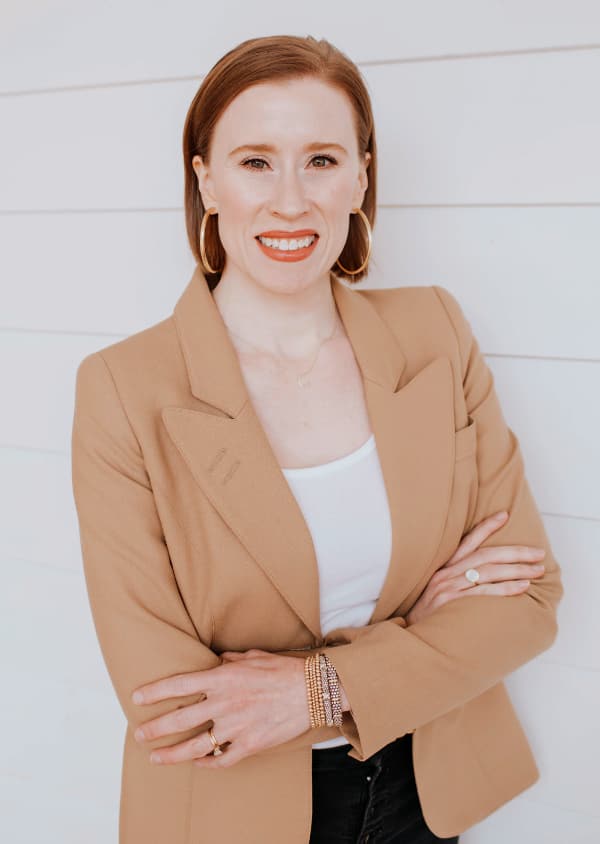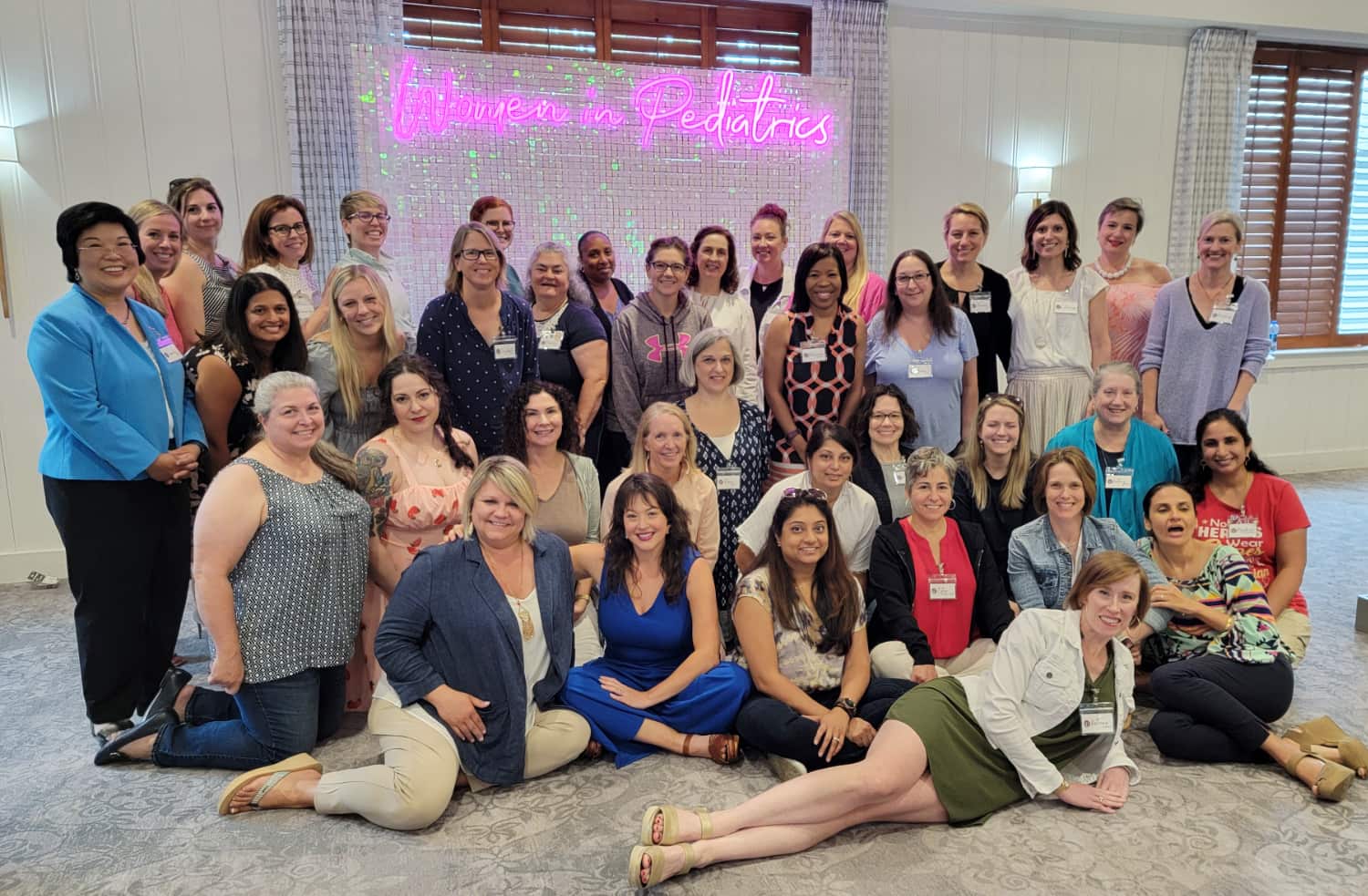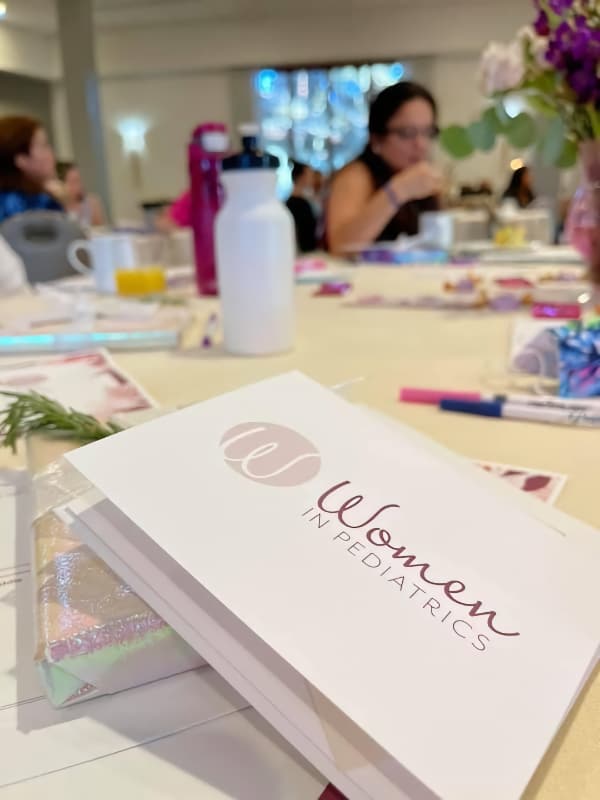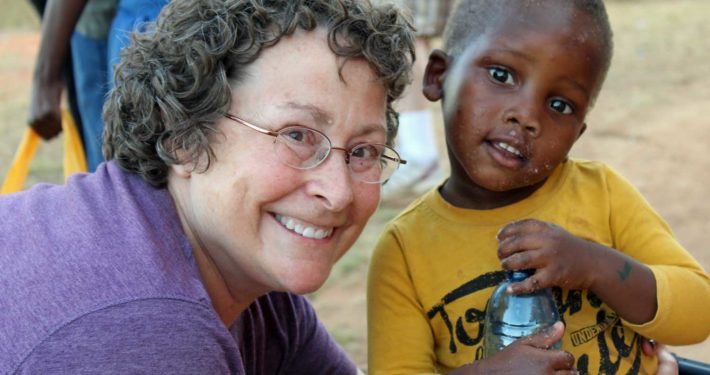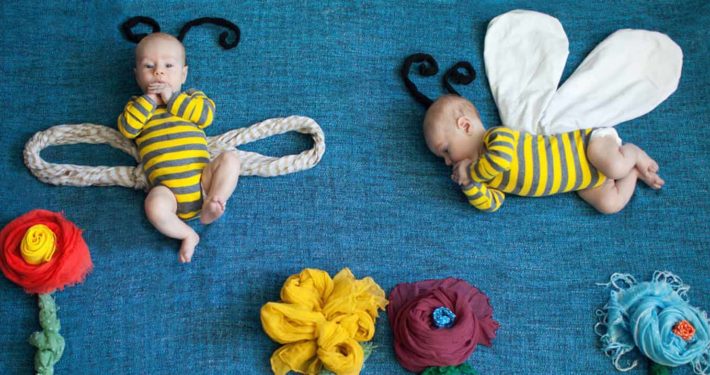An Essential Space for Women in Pediatrics
The Women in Pediatrics Retreat, founded by Katrina Skinner, MD, FAAP, prioritizes creating a space where women pediatricians can connect, practice vulnerability, and walk away with a newfound sense of confidence and self-compassion.
Though equal representation and opportunity for professional women has skyrocketed in the past few decades, women still face a unique set of challenges and obstacles in the workplace. For women pediatricians, these challenges can include isolation, burnout, working the “second shift” at home, and more. Dr. Katrina Skinner, founder of the Women in Pediatrics Retreat (WIP), aims to create a space where these challenges can be openly expressed and addressed. While skill-building is certainly part of this event, WIP prioritizes creating a space where women pediatricians can connect, practice vulnerability, and walk away with a newfound sense of confidence and self-compassion.
The Gap Between Pediatrician and Entrepreneur
In late 2019, Dr. Katrina Skinner felt she was missing some important information. As the owner of an independent practice in Fairhope, AL, Dr. Skinner was thriving as a pediatrician but had some questions about running a business, particularly as a female entrepreneur. “I found that as a business owner I was seeking knowledge but I couldn’t find it in the traditional medical education space,” Dr. Skinner explains. “As a female entrepreneur, I wanted resources that could help me be a better business owner, a better boss, a better leader, but I wasn’t able to find the content that I needed. I wanted to learn from other women pediatricians, people who understand the challenges unique to women in our profession.”
Dr. Skinner found herself exploring resources outside of the medical field, ones that weren’t tailored to physicians but that offered guidance to female entrepreneurs across many industries. “Engaging with these resources, I started to think about what tools women needed when we enter the world of private practice ownership,” Dr. Skinner says. “I realized that if I’m out here looking for these resources, there are other women who are in the same position. Maybe they don’t realize that they need these skills but they do.”
For Dr. Skinner, honing business management and leadership skills were central to her search. “Maybe if I’d gotten an MBA when I was in school I would’ve felt more equipped, but traditional medical school doesn’t offer a ton of business education,” she says. “I also wanted to grow my leadership skills—like how to be a better manager of people, how to carry yourself and present yourself, how to negotiate and ask for things. I found myself at the beginning of the pandemic being called on to do a ton of media interviews, so I had questions about that. How do you look good in front of a camera? How do you carry yourself, how do you speak?” Dr. Skinner continues, “I needed these things, and I want to empower other women with these skills too, so that they can go forth boldly and accomplish what they want in their field. That’s one of the main reasons I founded the organization.”
“As a female entrepreneur, I wanted resources that could help me be a better business owner, a better boss, a better leader, but I wasn’t able to find the content that I needed. I wanted to be learning from other women pediatricians, people who understand the challenges unique to women in our profession.”Dr. Katrina Skinner
The organization she’s referring to is, of course, Women in Pediatrics. Dr. Skinner saw a gap in continuing education offerings for women in pediatrics, and she decided to fill it. “Providing education is a huge part of Women in Pediatrics,” Dr. Skinner says, “I’ve tried to pull together all the resources I feel like I needed. But another pillar of the organization is that a lot of female pediatricians practice in a silo. Even if we’re in a group setting, a lot of times we don’t feel that we can connect or be vulnerable with those other people. For example, if you’re the boss and you have employees, there’s a barrier there. I thought that having a network of other women who can understand your struggles and the things that you celebrate would be game-changing, so I wanted to create that community.”
Erin Auer, a conference attendee and client advocate with PCC, speaks to the communal atmosphere of the event. “You’re a better doctor and mom and person when you fill your cup first,” Auer says. “And that’s really the goal of this retreat—to provide a space for female pediatricians to fill their cup.” 2023 marked the third in-person Women in Pediatrics Retreat, the first being virtual due to COVID-19. The event was held in Puerto Rico this year. With 90% of new pediatric practices started by women, the event couldn’t be more relevant.
While leaders in the field, as well as more established pediatricians, tend to be male, Dr. Skinner reports, “While more new residency grads and practice start-ups are women, that trend doesn’t carry over into leadership roles in the industry.” Erin Auer confirms this. “Women seeing other women as strong confident speakers and leaders in the field is an essential part of Women in Pediatrics,” says Auer.
“A lot of female pediatricians practice in a silo. Even if we’re in a group setting, a lot of times we don’t feel that we can connect or be vulnerable with those other people. I thought that having a network of other women who can understand your struggles and the things that you celebrate would be game-changing. I wanted to create that community.”Dr. Katrina Skinner
What Do Women Pediatricians Need?
Women across all professions struggle to achieve life-work balance in a culture that still centers women as the main contributor to household labor, often referred to as the second shift. In a 2018 report, the Center for American Progress asserts that, “While paid employment is an important and time-consuming aspect of most individuals’ lives, unpaid household labor and caregiving are also vital to the overall functioning of society… working women and men do not have equal experiences when it comes to how they spend their time on paid and unpaid labor… without public policies that reflect current gendered caregiving demands, women will continue to operate at a disadvantage in the paid workforce.” Looking at health care specifically, a 2019 study from the National Academy of Medicine on issues faced by women physicians reports that, “On average, women who are employed and whose partners also work perform an additional two hours of work at home per day, an increase three times higher than that reported by men whose partners work.”
Dr. Skinner noticed that women in pediatrics do not escape this imbalance. In her own experience, and through conversation with colleagues and Women in Pediatrics Retreat attendees, she sees a throughline of women feeling overwhelmed by their myriad responsibilities. “A challenge for women in healthcare and throughout the workforce is that we’re in an era for women where we are doing it all,” Dr. Skinner says. “We’re working the fulltime job, handling everything at work, then going home and running the household as well. Maybe we’re taking care of aging parents, trying to be involved in our communities, and raising children.” She continues, “Women need spaces that will help them find balance, where they can talk with other women about their struggles.”
“It’s such an energizing and inspiring event. I came back full of positivity, ideas, and new drive to get to work.”Kelsey Taveras
Research corroborates Dr. Skinner’s observation; studies have found that women physicians are more susceptible to overworking and burnout as compared to their male counterparts. This can be due to a number of factors related to gender bias, such as men and women physicians receiving differing levels of financial support early in their careers, or maternal discrimination towards physicians breastfeeding at work. Dr. Skinner offers her own insights into gender-based burnout in health care. “When I think specifically about women in pediatrics, we can experience greater emotional investment than male physicians,” she says. “There are studies that show that women, even when they share the same workload with male physicians, tend to invest more time in our patient visits. The emotional toll is greater for women pediatricians because we can get more enmeshed in the social-emotional needs of our patients and their families.” With clinician burnout constituting a national health problem for both providers and patients, particularly in the era of COVID-19, providing safe spaces to address fatigue, overwhelm, and overwork is critical.
One of the main goals of WIP is to offer sessions that give women tools to identify and manage their burnout, and regain balance in their lives. “The conference offers a lot of professional skills, but it’s more holistic than that,” says Kelsey Taveras, an attendee at the 2023 Women in Pediatrics Retreat in Puerto Rico. Taveras is also a business analyst with PCC. “One of my favorite parts of the event was a talk called ‘Taking Your Voice Back’ with Dr. Nola Ernest,” she says. “Women around the room were crying because we really need the message that we are not alone in what we’re experiencing and we have the right to ask for our needs to be met.” Women pediatricians also carry the burden of qualities women and girls are socialized to exhibit: acting agreeable, putting others first, and notably, higher risk-aversion, which can prevent women from going for promotions, asking for raises, or setting boundaries. Women in Pediatrics speakers, sessions, and community gatherings aim to bring these issues to the forefront and address them practically, holistically, and compassionately.
What Women Learn at a Women in Pediatrics Retreat
Women in Pediatrics offered sessions directly designed to name and mitigate things like burnout. One session with Dr. Molly O’Shea, MD, helped women both identify hidden stressors in their workload and in their physical bodies. Dr. Skinner raves about the sessions and faculty at Women in Pediatrics, but she can’t stress enough the importance of the more casual community interactions. During these gatherings, women get to hear about solutions that other women are ideating. “It gives people an opportunity to say to themselves, ‘if she can do that, I can do it too,’” says Dr. Skinner. “Women are looking at more creative ways to approach their work as physicians, like job sharing or working different hours, even female practice owners who may set nontraditional office hours that might better suit their life and their desires to fill multiple roles in their lives.” She continues, “Someone who attends the retreat may not have an example of these kinds of solutions in their community.”
Erin Auer and Kelsey Taveras highlight this aspect of the event as well. “Seeing women making new friends and finding commonalities with other people is one of the beautiful things about the conference,” says Taveras. Dr. Skinner reports that 25% of attendees from 2023 have already signed up for the 2024 event, and a list of sessions and speakers hasn’t even been released yet. “Women come back every year for the community,” she explains. Women in Pediatrics is also intentionally kept small, hosting a total of approximately 65 attendees. The small size of the event allows for attendees to forge deeper connections and bonds that might not be possible at a larger conference. “We started off small because that was just the number of people we were attracting,” says Dr. Skinner. “Now we get feedback from our attendees on the ideal size for the event and we try to respect that. We try to listen to what attendees feel like the sweet spot is. If it gets too big it’s hard to provide space for intimacy and close connection.”
“Women seeing other women as strong confident speakers and leaders in the field is an essential part of Women in Pediatrics.”Erin Auer
As an attendee herself, Erin Auer speaks to the positive impact of this intimate space. “The vulnerability, honesty, and openness that’s shared across the board is a highlight for me,” she says. “It’s the speakers and sessions, but it’s also women talking one-on-one during social events. People are able to let their guard down. They don’t feel like they have to worry they’ll be perceived as overly emotional or unprofessional.” Part of what helps set this tone of vulnerability and openness are the speakers. “We had quite a few speakers who knocked it out of the park, and they did that by telling very vulnerable and personal stories,” explains Dr. Skinner. “The vulnerability led to insights about how to move forward. There were a lot of connections made during those sessions, and I know that was a highlight for attendees.” One such speaker is Dr. Lulu, whose aim is to teach women how they can use their personal stories to connect with others.
While the retreat can be an informative, healing, and even cathartic space for many, Dr. Skinner is also thinking about integration. How can women take what they’ve learned home with them and actually improve their daily lives? “Because women tend to put themselves last, it’s even harder to sustain the changes you might want to make following an event like this once you return home,” Skinner says. “If I could remind our attendees of one thing it would be that they can give themselves permission—that they don’t have to follow some prescribed ideal that they think has been set for them, that it’s okay to take a pause or change their path.” She continues, “the advice I try to follow that a mentor gave me is to every year do more of what I love and less of what I don’t. So give yourself permission to aim toward that goal and aim for more balance.”
Another avenue towards integration is to stay engaged in Women in Pediatrics throughout the year and consider speaking or hosting a session in 2024. “We provide opportunities for women to nominate themselves or their colleagues to be speakers or faculty at the event,” Dr. Skinner says. “I encourage all of our attendees to look into that. We’re also sponsoring a blog post once a month that’s being written by our community members. Writing can help people reconnect to the energy they felt during the in-person event.”
As for Taveras and Auer, they are both grateful for the opportunity to have attended the Women in Pediatrics Retreat. “It doesn’t hurt that it’s in Puerto Rico in the winter,” Taveras laughs. “And it’s such an energizing and inspiring event. I came back full of positivity, ideas, and new drive to get to work.”
Emily Graf is a freelance writer, wilderness educator, and English teacher living in Colorado. She is passionate about telling stories that promote equal access to quality health care. She can be contacted at emgraf11@gmail.com for inquiries.



